US-Russian Relations: The Impact of the Sochi Olympics and Turmoil in Ukraine
Angela Stent, Georgetown University
Photos
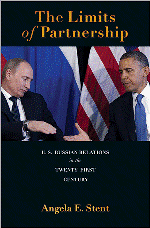
Washington, DC—On February 25, 2014, Angela Stent, Director of the Center for Eurasian, Russian and East European Studies at Georgetown University and author of The Limits of Partnership: US-Russian Relations in the Twenty-First Century briefed WFPG on US-Russian relations. In addition to a brief overview of the history of the post-Soviet relationship, she covered the current issues facing the two nations, namely: Snowden, Syria, Sochi, and now, turmoil in Ukraine. The event was moderated by WFPG President Patricia Ellis.
Stent asserted that as a result of Putin’s decision to grant Snowden asylum, the bilateral relationship has sunk to “a low that we haven’t seen since the Russia-Georgia War”. She explained that although detrimental to relations with the US, this decision can be construed as rational foreign policy choice for Russia, especially in light of the tensions that the leaks have caused between the US and some of their closest allies.
As the situation in Ukraine continued to unfold, Stent briefed members on the key issues and gave her recommendations. She emphasized that since Ukraine is extremely historically and geographically important to Russia, the US and the EU needed to determine how involved they are prepared to be. Stent noted that although the issue has all the markers of an “old fashioned geopolitical competition” between Russia and the West, she urged us to bear in mind that Ukraine has been unable to establish an effective system of government and a cohesive national identity, and now faces severe financial constraints. Stent recommended that Russia work with the US and EU to put together an aid package to save Ukraine from default and encourage a democratic transition.
Stent considered Sochi to be a great success for Russia and an example of where the US and Russia “cooperated and competed.” She did not believe that the games improved Russia’s relations on the world stage or changed Russia’s global image. She noted that Russia sees itself as a separate model for other countries, both in terms of moral values (as seen in the lead-up to the Olympics), and in terms of how the international system should operate—a model based in absolute sovereignty, which rejects the imperative for humanitarian intervention.
Comparing the US and Russia’s complex relationship to a rollercoaster ride, she outlined the “resets” under the administrations of Presidents George H. W. Bush, Bill Clinton (NATO intervention in the Balkans), George W. Bush (post 9-11), and most recently, Barack Obama. The high expectations of each reset quickly deteriorated into mistrust and disappointment between the two nations. Stent stressed that we should meet further negotiations with more realistic expectations, rather than expecting that yet another reset will be the “golden key” to transform the relationship. Going forward, Stent believes that the two nations should continue to work together on global issues like Syria and the Arctic. She does not however, see much possibility for movement forward in the bilateral relationship in the short-term, especially if Snowden continues to receive Moscow’s protection. /span>
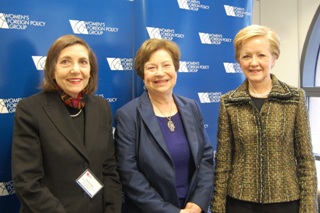 |
 |
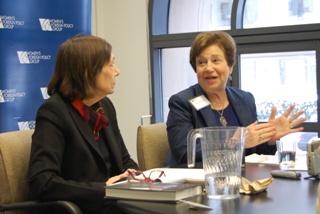 |
WFPG President Patricia Ellis, Author Angela Stent,
and Board Chair Ann Stock |
|
Patricia Ellis and Angela Stent
|
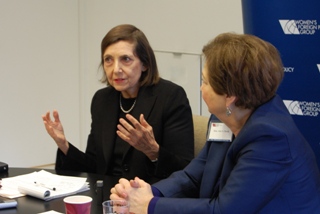 |
 |
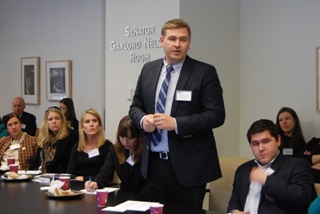 |
Patricia Ellis welcomes guests
|
|
Yaroslav Prytula, University of Lviv Professor
and Fulbright Scholar |
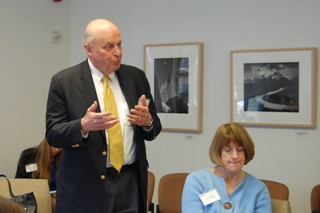 |
 |
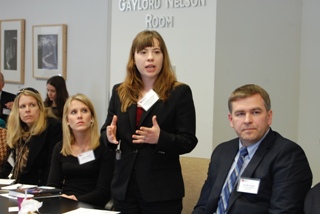 |
Ambassador John Negroponte of McLarty Associates
|
|
Anna Borshchevskaya during Q&A
|
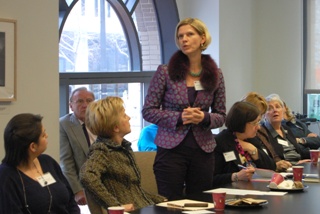 |
 |
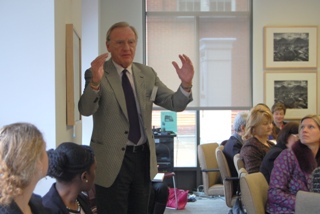 |
Anna Kuchenbecker of the Institute
for Inclusive Security |
|
Jerry Jasinowski asks a question
|
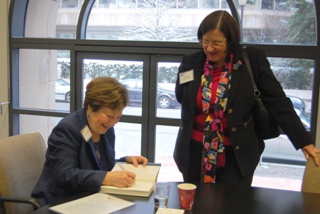 |
 |
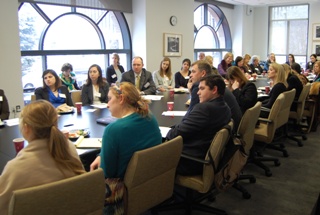 |
Angela Stent signs a copy of The Limits of Partnership
for Anne Vasara, Minister, DCM of Finland |
|
Members and guests during the program
|